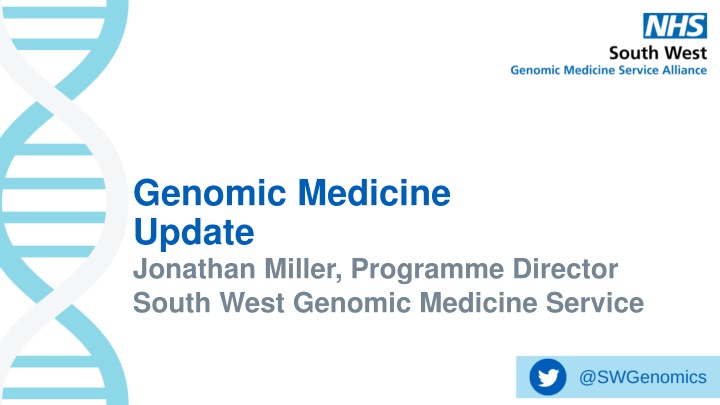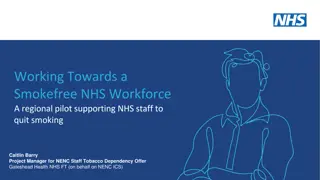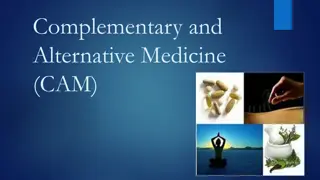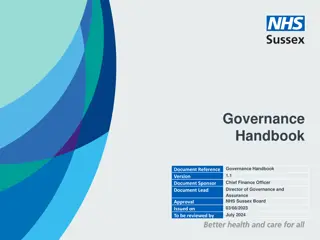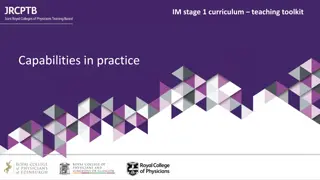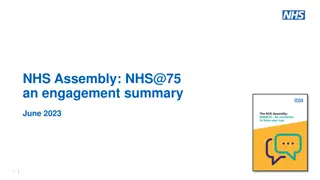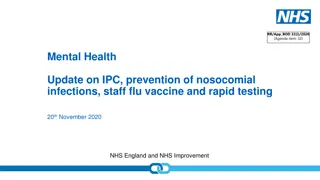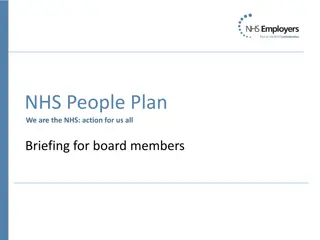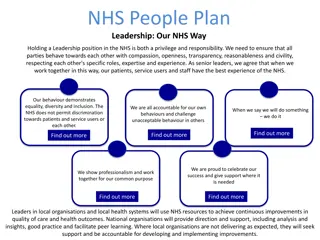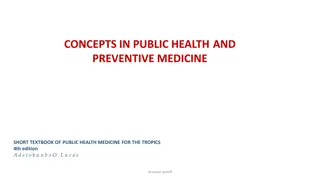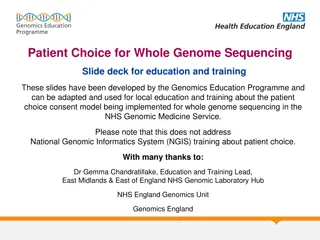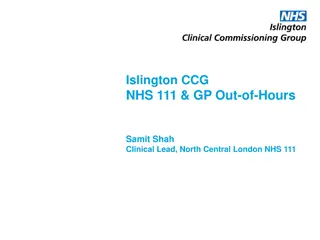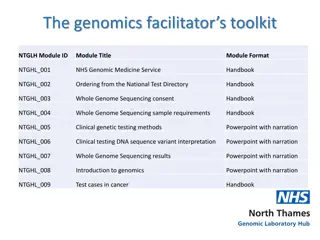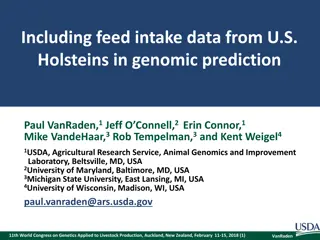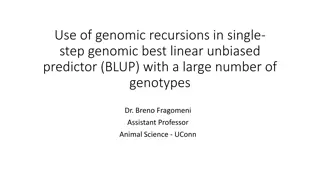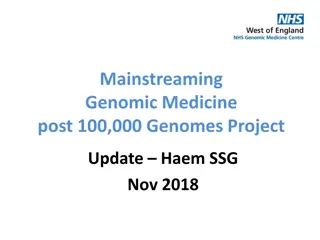Latest Developments in Genomic Medicine and NHS Genomic Strategy
The genomic medicine field is advancing rapidly, with a focus on enhancing healthcare services through genomic testing for prediction, prevention, diagnosis, and precision medicine. The NHS is actively integrating genomics into its healthcare system, aiming for equitable access to genomic testing. Initiatives like the GALLERI Trial for population screening and the Lung Cancer Gene Panel Tests are transforming cancer services. The new National Genomic Strategy outlines plans to incorporate genomics across the NHS in the next five years, emphasizing the pivotal role of genomics in the future of healthcare.
Download Presentation

Please find below an Image/Link to download the presentation.
The content on the website is provided AS IS for your information and personal use only. It may not be sold, licensed, or shared on other websites without obtaining consent from the author.If you encounter any issues during the download, it is possible that the publisher has removed the file from their server.
You are allowed to download the files provided on this website for personal or commercial use, subject to the condition that they are used lawfully. All files are the property of their respective owners.
The content on the website is provided AS IS for your information and personal use only. It may not be sold, licensed, or shared on other websites without obtaining consent from the author.
E N D
Presentation Transcript
Genomic Medicine Update Jonathan Miller, Programme Director South West Genomic Medicine Service
New National Genomic Strategy Accelerating Genomic Medicine in the NHS A strategy for embedding genomics in the NHS over the next 5 years (Oct 22) https://www.england.nhs.uk/publication/accelerating-genomic- medicine-in-the-nhs/ Delivering equitable genomic testing for improved prediction, prevention, diagnosis and precision medicine. Genomics will be at the heart of this future and the next generation of healthcare in the NHS. The NHS will explore the utility of genomic testing to support population screening for cancer [GALLERI Trial]
Transformation Projects : delivering change to improve services Transformation Projects funded nationally ..delivered locally
Lung Cancer Gene Panel Tests Mainstream the delivery of the Lung Cancer Gene Panel Tests in cancer services Develop the pathways and demonstrate the value of gene panel testing Type of Project Local Lead GMSA South West GMS Alliance SW Lead: Dr Nidhi Bhatt Nidhi.bhatt@nbt.nhs.uk
Lung Cancer Pathology Pathways: Referral to treatment Lung Tissue lab Pathway in the GHFT AS IS SW GLH Molecular Laboratory NBT Clinical/Biomedical Scientists Inspect reason for submission of a new NSCLC sample ?delay in arriving at spec rec Theatres will record extraction but less likely in DC procedures AS IS Specimen Reception Form and Sample pot: Generated labels with name, NHS number, DOB plus lab episode identifier and histology number Ensure clearly noted no histology required, for molecular section after embedding Is Molecular only required? Yes yes Senior spec rec technologist f/u Entered onto TCLE to generate Histology number Incomplete labelling Accompanying slides Specimen Reception problem box Sample received no Any previous samples on this patient? Cassette: Main Reception Molecular Reception Taken up to cut up imediately after receipt Placed in priority tray by MLA accompanied by histology form no Generated cassette with histology number and surname n Scan request into LIMS record Brought in by Porters to pathology reception or to histology reception Added to cases to book in: Check Lung Tissue lab Pathway in the RDUH prioritisation process 1day (next day in some instances as per SOP) Check sample matches against referal Reception All treated as urgent Received NBT 7 pathology spec rec paperwork to determine correct lab location Logged onto to LIMS POD to correct lab location spec rec Unpack sample Sufficient Information y AS IS Every data point on the form can be entered into the LIMS Postcode not address. test required referers (can be added on later if missed or wrong)Adds to extraction worklist Duty scientists see referral and review Appropriateness of test Information is correct Reports are going to the right people PDL1 do for north devon and torbay- they have access to the reports on EPIC Specimen Reception Added to worklist in the LIMS system Processor no.1 (of 6 processors) used as urgent for all samples. See sheet to check designated processor No other checks Not booked in at this point Lung prioitised in staining, during slide-sorting, technical approval and case allocation Sample that arrives on a Wednesday extracted thurs fri and the DNA etc ready for Monday run Sectioned immediately as urgent. 1x H&E with levels 1 and 8x USS with 1 section each Rapid Processing starts at 10am Takes 3 hrs 20 mins rather than overnight Specimen Management Porters have fixed run times Samples Samples for histology moved to bench with labels Samples for molecular only handed in to the Molecular Team Porters bring directly to old Path reception area Create worklists for NGS team Logged onto epic (paperless process) Before 9.30am RDUH Sample and Paperwork received in Cut Up Case filed in lung-dedicated orange slide tray for easier identification by Scientists, Clerical staff and Pathologist Band 3 staff 1 hour Band 3 staff Overnight process Mon-Thur 9.30am - 3.30pm Embedded Microtomy Slide stained Friday 10.30am and 3.30pm Triaged to ensure urgent labels are added TCLE is the only time stamp Specimen Management Main lab team (separate skills re cores- advance microtomy) Weekend Run Curls preferable as quicker for extraction but better tumour content if you macrodisect slides Extraction Lab RNA DNA Only small specimens Reassign immediately Straight onto the machine Overnight Next day same day Same day Macrodi sect the slide no Identify samples post extraction Stored in -80 freezer Extraction process Quantify RNA DNA Added to LIMS Lab for processing Fixation process Block created Slides created the Assigned to name on dedicated rota assigned correctly against worklist RNA DNA Dilution Check scanned form against the worklist Pathology reporting Pathologist completed internal request form for molecular testing Physical requests added onto TCLE, retrieval of blocks Slides stained, technically approved and given to Pathologist IHCs and/or special stains requested using request forms and electronically y Microscopical assessment IHC or special stains required? Pathology report issued FFPE block process yes Microtomy Defined freezer location on a list different technologist but same lab Technologist no Internal paper request form- follows the sample. will add PDL1 if required Manual copy will be added to during molecular testing ICH inhouse for PDL1 Pathology report issued Immuno/special team Dependent on which porter run? Same day or following day Only 4 path managing the lung speciments PCR Lab Bioinformatics Analysis EGFR BRAK KRAS Pathologist makes the approriate molecular request Make the diagnosis Molecular testing Beaker request (EPIC) made for idylla returned to requesting pathologist Scanned into Beaker Report generated Verify report Tuesdays and Wednesdays Often on a Friday so run over the weekend Load on a Thursday 2 years of blocks in Gloucester 2.5 hours Cheltenham immediate Older cases in Cellnass 2 van runs leave at 9.50 and 3.30 from downstairs reception. Is ther one lunch time or time 5 hours UHB form for PDL1 Reflex done at the same time Will only discuss with clinicians if the sample is really limited therefore ask oncologist what tests they want to prioritise Send samples to Birmingham 36 hours 2 day Spare slides Courier times? Assigned into work folders (local system) NGS Pathologist/trained scientist assesses section Full panel Analysis: Variants, reportable variants Report generated in LIMS Triaged by genetic technologists Check who report to be issued to Morning will go out same day Check for sample failure Electronic PDF for Bristol GLH completed by the pathologist emailed request to the secretary's to complete 2nd check Thermocycler Sequencer DNA Nexus Data released entry on departmental database, addition of test set into TCLE Complete transport form Lab will pick up the form and make the required arrangements left in a basket in the lab for additional requets Molecular testing Shallow, single section H&E cut for tumour assessment Added to the packing list Printed out Specimen prepared depending on tumour content 10xslides at 5um or 5x10um curls downstairs couriers Emailed request from oncologist Is tumour present in the sample? Photocopy Internal Request EPDF Prep to Send sample to NBT GLH retrieval of blocks Dropped into designated box for Bristol transport Update database 96 plate 2x week Clinical scientist 7 Analytical genetic technologists 5 yes Half a day to load 1x a week Timed over the weekend data upload in cloud to run the pipe lines Hope to go over electronically using in Beaker 24 and 48 hours between sending and logging to bristol no EPDF printed yes MLAs E PDF GLH Further levels taken to assess suitability for molecular testing only 3 days NGS set up 1 day 1 day filed in box to wait for the report to be returned Suitable for molecular testing only? No molecular testing Needs to be requested before 12 if at cellnass for next day delivery (charge included- standard charge) no completed electronicaly before being printed off at point of prepping Report emailed to a generic email for the pathology team Print out the report and adding to pigeon hole Secretarial team member as rostered will access generic email box Authorisers should have enough time to have a day but in reality authorised in a few hours Scanned into Beaker Reporting Verify report How are reports for Torbay collated and distributed? Authorisation How is this communicated back to the requesting team? Report issued Report managed (external) Return to the person who generated the report Include next steps required eg repeat test. May make minor amendments themselves Clinical requestor Upload OR Transcribe Member of molecular team ensures pathology report is authorised prior to releasing from department Authorisation and Reporting Aim to get them out the same day- here until 6 Variable time delay close to 20 days (15-18) Inform the requesting pathologist Returned to Requestor Currently cant be viewed- converted to word to be cc into system BUT this is to be changed to allow people to view an electronic attachment database updated and added onto TCLE Checking and authorisation of results Results received electronically Is follow up required? Email sent to oncologists GLH yes reject Sent to an authoriser word format but in the LIMS system Cell Path Cut and paste Authorised Released Cell Path Upload to Path LIMS Authorise and add signature admin distribution queue PDF result and email it Report detail correct Admin checks Report to requestor Email to generic histology email Reporting Admin team accept Scientists check if everything is back if not- awaiting the rest . Check paper box first and database if worried. Will check on the database to see if actioned/track Communication with requestors via a variety of communication channels Email to oncologists Other tumour types use other forms of communication no Report and results makes clinical sense cross references correct Report to be issued to DNA and RNA panel at UHB Separate reports PDL1 to university hospital Birmingham UHB (will continue to ensure consistency for GHFT) Where is it filed? How is it accessed? Returned to Cell Path Member of molecular team ensures pathology report is authorised prior to releasing from department 5 mins- 4 hours per samples Lab admin team 1 day Average TAT sep 2022 = 11 days Day 49? Day 0? Day 21? Day 6? Histology Cell Path Patient referal Diagnostic Testing Clinical Decision Patient Appointment Molecular Testing Report MDT Treatment Are genomic reports discussed? How are outcomes recorded Integrated into diagnostic testing? Is this used to impact on treatment decisions What tests are requested? Who does the testing? What is the failure rate? How long does each part take? What is the capacity? How does this link to research Do we know we are optimising testing to support clinical trials How do patients enter the service? Where do patients enter the service? Where is the appointment ? Is testing same day? Is testing same site Who is the appointment with? Are you using molecular reports to drive personalised treatment? Is there anything missing? Straight to test? Waiting times Where does it take place? What range of tests are available locally When does the clock start? Reflex testing? OR who requests molecular testing and when? What testing is in house? What testing is send away? Where are samples stored? Virtual or in person? Integrated into diagnostic testing? Where is the report sent? Who is responsible for the report? Where is the report kept and who has access? What is the impact on reporting times for individual and integrated reporting/Diagnostic v treatment reporting? Does everyone know what to do with the report and its findings?
Gloucestershire Hospitals Genomic Pathology Project Torbay and South Devon Hospital Pilot of MDT Coordinator time for Genomics, including Audit of Lung Panel Gloucestershire Hospitals Genomic Pathology Project Lynch Syndrome Pathways Gynaecological Cancer Pathway HRD/BRCA NTRK tumour agnostic General impact on cellular pathology General impact on wider workforce, patient and Trust
National Genomic Pathology Accelerator Programme Audit of pathology processes for genomic testing in 10 NSCLC cases Series of workshops Tissue Pathways: Introduction to phase 2 Setting the baseline Genomic friendly pathways Tissue handling; establishing best practice Pathway choices Test requests and sample logistics: Request mechanism electronic V paper Metadata and minimum datasets Routing Roles and responsibilities Walking the Path Make it flow 14th Sept 2022 17th Oct 2022 Interpretation and integrated reporting: IT, reporting and interoperability: Joining the dots The missing links Overviews PreTABs GTABs 24th Nov 2022 14th Dec 2022 Integrated reporting Access to clinical trials Research and Development: Overview of current R&D within the GMSAs Novel fixatives Alternative approaches to sample acquisition Tumour cellularity assessment AI/IA Collaborative R&D between Cellular Pathology and Genomics Back to school Thinking outside the box Training and education: Overview of training and education Workforce planning and strategy/ Recruitment and retention Update from National Programmes Jan 2023 Feb 2023 Discussion and next steps Pulling it all together What have we achieved?: Summary and reflection form each GMSA on the workshop they hosted. March 2023 Summary from each GMSA on progress made during the project. Next steps
Cancer Pathology & Genomics Clinical Case For Change Policy What is Expected Commissioning What is Required GLH Workforce Informatics Pathways Component Pathology Policy Cancer Policy
DPYD Gene Optimising and improving clinical effectiveness of DPYD Gene Testing for patients with Cancer DPYD testing before receiving fluoropyrimidine chemotherapy DPYD testing embedded in local standard operating procedures and patient pathways Type of Project National Lead GMSA North West GMS Alliance SW Lead: Rachel Palmer SW GMSA Pharmacy Lead rachel.palmer6@nhs.net
ctDNA Using blood samples to test the circulating tumour DNA (ctDNA) for the presence of disease-causing mutations in Non-small Cell Lung Cancers. This will support faster genomic diagnosis and offer testing for those in whom a solid tissue biopsy cannot be taken Type of Project National Lead GMSA North Thames SW Lead: Jonathan Miller jonathan.miller@nhs.net
National ctDNA Project NHS England has funded an evaluation of the use of blood samples to test the circulating free DNA (cfDNA) for the presence of disease-causing variants so that it can make the case for making ctDNA routinely available for NSCLC This is being offered to patients with radiological evidence of suspected stage 3 or 4 thoracic malignancy (assuming performance status 0 to 2 and suitable for SACT) Liquid Biopsy (ctDNA blood test) is to be taken as early as possible after the initial CT scan (prior to biopsy) SW GMSA GMSA has procured 100 ctDNA tests from Roche Signed up: NBT, UHBW, RUHB, Somerset (MPH) Gloucestershire already using ctDNA with SWAG funding
Lynch Syndrome Delivery of a comprehensive service for the detection of Lynch Syndrome patients Development and embedding of pathway included in national proposal Type of Project National Lead GMSA North Thames and South East SW Lead: Mr Frank McDermott f.mcdermott@nhs.net
Leukaemia Predisposition Standard genomic testing may identify germline variants that pre-dispose to leukaemia which may also impact the treatment of patients with leukaemia and are highly pertinent for family members. This project will provide guidance and a clear pathway for haematologists to support the management of this cohort of patients and their relatives Type of Project Local Lead GMSA SW GMS Alliance SW Lead: Prof Andrew Mumford a.mumford@bristol.ac.uk
Inherited Breast & Ovarian Cancer Patients diagnosed with breast or gynaecological cancer who have a germline BRCA variant that is a risk of cancer will receive consistent management and support Relatives of those with a germline BRCA variant that is a risk for cancer offered cascade testing to be diagnosed and supported Type of Project Local Lead GMSA SW GMS Alliance SW Lead: Tracie Miles SW GMSA Nursing and Midwifery Lead tracie.miles@nhs.net
Inherited Breast and Ovarian Cancer Key Achievements Five BRCA nurses trained to educate and cascade mainstreaming in breast and ovarian pathway. Two genetic counsellors supporting the project working closely with the 5 BRCA nurses. Supporting mainstreaming requesting of R208 (BRCA+ PALB2, ATM, CHEK2 ) Breast Cancer Genes and Me Grant to include a breast cancer information animation and online counselling and consenting package Patient Info CONTENTS
